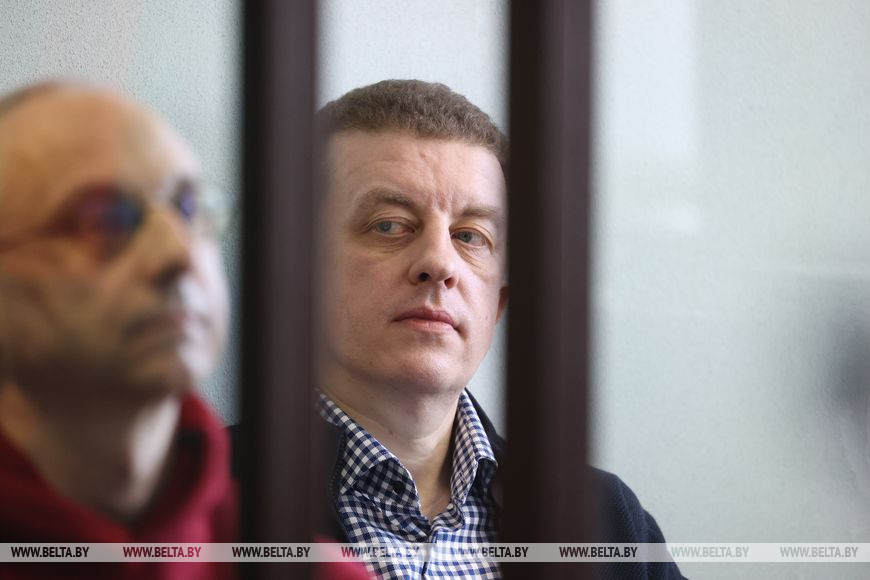I was nervous during my first trial. No wonder – I’ve never been under arrest before. I was nervous even though I did not commit any crime.
I went through quite a rough detention in Minsk in October 2020. After the rigged presidential elections in Belarus in August 2020 there was a wave of protests, which were brutally suppressed.
Roughly 40,000 people went through administrative arrest just for taking part.
The majority of those people peacefully protested on the streets and now they being accused of participating in mass riots and violating the law. Some were journalists whose work the Belarusian state now calls treason. They include a broad range of ordinary Belarusians, from baristas to CEOs of IT start-ups, cultural workers to taxi drivers, who simply wanted a change in their country.
These people are being kept in pre-trial detention centres for up to a year and a half. Some are kept with up to 18 room-mates in crowded cells measuring five by six metres with no ventilation. They are poorly fed, allowed to shower only once a week for 20 minutes, often with no hot water and they are deprived of correspondence.
Thousands of those arrested have submitted statements to the International Committee for Investigation of Torture in Belarus (ICIT), a coalition of five human rights organisations in the country, to say they experienced different kinds of torture during their detention.
I was one of the lucky ones who did not face this horror.
My so-called trial was very fast and conducted via Skype. In the day of the trial I was told to go into the corridor from my cell where an officer with a computer was waiting for me. I went from the cell with my dirty hair, not looking good at all, and still wearing the hipster jacket in which I was detained. I saw the look on the computer guy’s face: he could not believe that I may have commited something that had brought me to prison. I asked him: “Do I look a dangerous criminal to you?” He kept staring at me and said “No…”.
My trial lasted for around 20 minutes, with the judge somehow pretending to follow the procedure, saying all the necessary but impossible to process judicial words very fast. The verdict was predictable – guilty. My sentence? Detention for a month.
I had a chance to have a quick chat with my parents as they were in the courtroom together with my lawyer. Other political prisoners have no such chance to say goodbye to their loved ones.
There are 1,492 political prisoners at the moment, including Andrei Aliaksandrau and Irina Zlobina.
Andrei is a journalist and media manager, who in the past has worked with Index on Censorship. Irina is his fiancé – the main reason for her detention. Now they both are accused of organising mass riots and treason simply because they were helping victims of the August 2020 protests. Andrei has always been focused on developing high level journalism in Belarus and is an experienced manager, consulting in different countries; he is also a Liverpool FC fan. Irina’s flower shop was famous in Minsk and everybody knows of her boundless enthusiasm – but the regime is not interested in such people.
Unlike my trial, Andrei and Irina’s is closed. The Belarusian authorities often make a trial closed, citing the need for secrecy.
Sometimes the only chance to see a person in a closed trial is while they are being transferred to the courtroom. There are literally five or six seconds of them walking in the corridor when relatives will try to peer into their faces to understand how they are doing. The mother of one political prisoner played the audio of her grandchild, the prisoner’s little daughter, during this five seconds just so he was able to hear her voice.
The only sure way for friends and family of detainees in closed trials to see them is on state television which broadcasts short clips from the courtroom for the evening news or reports in other state media.
Belarusians don’t know whether to laugh or to cry about this. People are having to subscribe to these propaganda channels on YouTube and Telegram in order not to miss these first images because they haven’t seen their loved ones for so long.
I was nervous and angry during my trial, but I knew I was doing the right thing. The same is true for Andrei – as far as we know from his letters (which are censored and he is constantly being deprived of). Right before the trial he asked the media to publish his statement. In it he said: “I’m going into the trial with no illusion but with a clear conscience”.
Andei’s and Irina’s trial was set to last for a couple of weeks but at the end of June the trial was suspended for two months. It is quite predictable how it will end. What I know from my own personal experience and that of all the prisoners who are writing from prison is that the biggest fear is to be forgotten. We cannot change the course of the trial, but we can certainly influence it. Support the prisoners, share information about them, donate to help their families maintain their lives. This is how to show your disagreement and help change happen.





